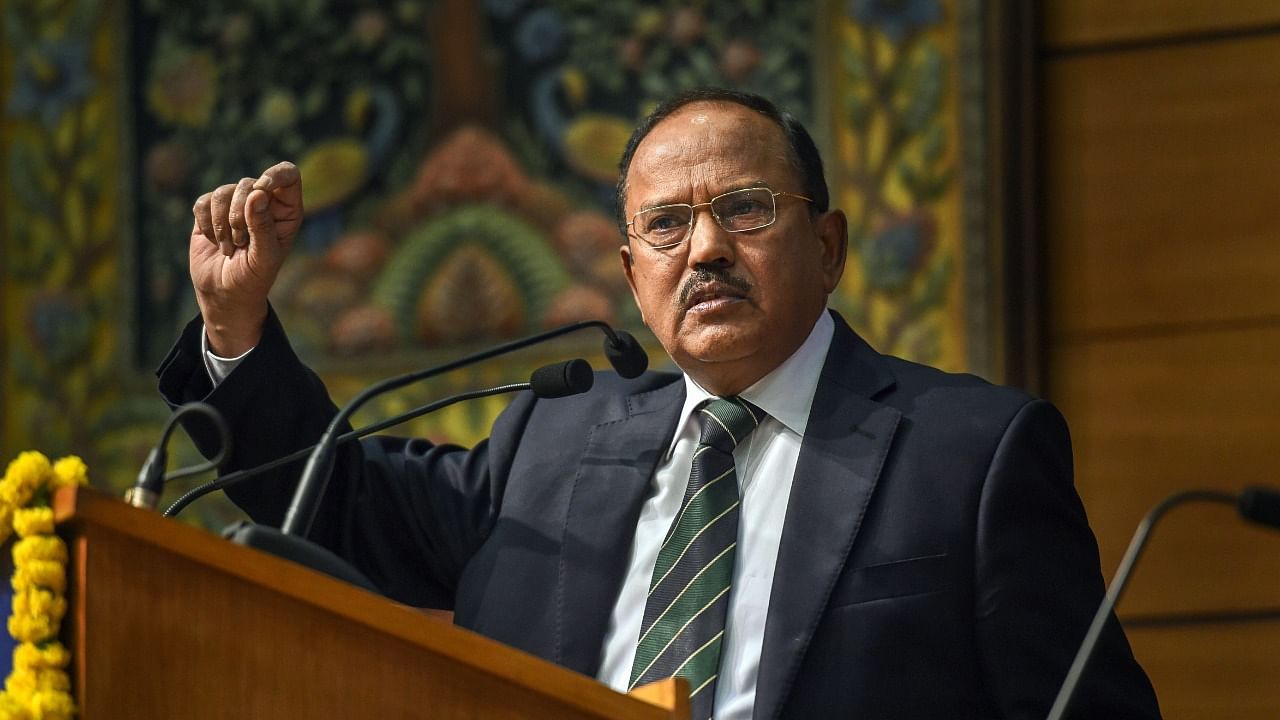
For the first time after the regime change in Kabul, India is hosting the "Delhi Regional Security Dialogue on Afghanistan", with several countries in and around Afghanistan taking part in the deliberations.
Unlike the traditional diplomatic conclaves on the situation since the dramatic developments of August 15 when the Taliban took control of the seat of power in Kabul, this dialogue is among the national security advisers or secretaries of security councils of Iran, Kazakhstan, Kyrgyz Republic, Russia, Tajikistan, Turkmenistan and Uzbekistan.
Missing from the list of participants are China and Pakistan. Beijing expressed interest to discuss the situation with India in a bilateral format, while Islamabad preferred to stay away as it perceives no role for New Delhi in Afghanistan.
Pakistan's attitude is not surprising. Policy planners in Islamabad and Pakistan Army have loathed India's contribution to the development in Afghanistan and the affection that Afghan people have for Indians. Over the years, Islamabad made a determined effort to keep New Delhi away from any discussion on the future of Afghanistan amid initiatives by the United States and Russia and its extended troika format that included Pakistan.
Although India was scheduled to host this meeting last year, the global health pandemic caused its postponement. It is being held now when the landscape has changed. Iran hosted the first two editions of this format in 2018 and 2019.
The presence of security advisors at the table, with India as its chair, underscores the strategic significance of the meeting. It puts New Delhi back in the security and strategic calculus of the region, and it acknowledges the role India can play in Afghanistan and other countries in the region.
The meet would review the security situation in the region and discuss steps to address security challenges and support the people of Afghanistan in promoting peace, security and stability. However, the question is, what will be the priorities of those present at the table? How do these countries come up with an agreed roadmap? The latter aspect becomes important since the current regime in Afghanistan is not part of the dialogue? So what should be the calibrated approach?
On top of the list should be the Afghan humanitarian crisis, ticking away and waiting to burst. Sparse reports trickling out of Afghanistan mention the everyday struggle of the people to put food on the table and meet basic healthcare needs. A more considerable challenge exists in the form of an economy on the verge of a collapse in the absence of any international financial support and legitimate trade.
Once conditions worsen and the situation aggravates, it is reasonable to assume that people would start fleeing Afghanistan to neighbouring countries and possibly enter India through longer routes. Every country around Afghanistan is conscious of this aspect of the imminent crisis. How should each deal with it individually and collectively, is the question?
The second aspect is the presence of terror groups in Afghanistan and their potential for disruptive activities in other countries. From all accounts so far, in making a transition towards a functioning administration, the Taliban has yet to grips with the situation.
Complicating the state of affairs is the periodic attacks from Islamic State-Khorasan, adversely affecting the Taliban's image when its leaders seek international recognition. At present, no country has recognised the new regime barring some informal engagements.
India's approach towards Afghanistan is that the country should not turn into a haven for terror groups and have an inclusive regime; and protect minorities, women, and children.
Before the US forces withdrew from Afghanistan, security and strategic analysts predicted a possible blowback in Jammu and Kashmir. Increased militant activities over the past few weeks in the Jammu and Kashmir heighten this anxiety even as the Indian security forces have a robust counter-insurgency plan in place for such a situation.
The accent of the current dialogue would be to develop a coherent strategy and convergence of thought on how to deal with the challenges. The arduousness of the task at hand would also consider the attitude of the new regime in Kabul experiencing convulsions of its own.
While China too is not attending, Beijing adopted a more nuanced stance in conveying its approach. Interestingly, before bilateral relations with China took a nosedive, both countries had agreed to work together in Afghanistan and train diplomats as the first step. It would be interesting to watch China's overarching policy towards Afghanistan since most countries at the table on Wednesday maintain strong bilateral ties with Beijing, which seeks to expand its role in the country and the region?
(The writer is a journalist based in Delhi)